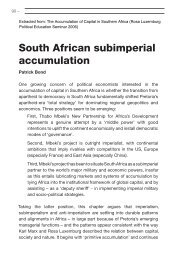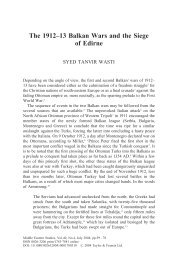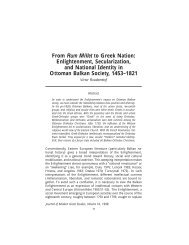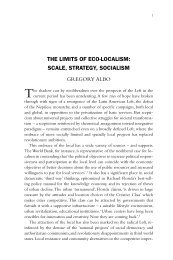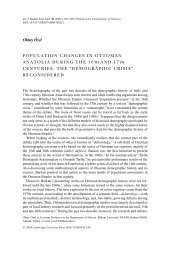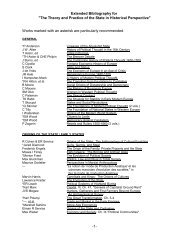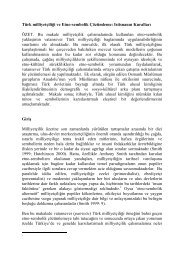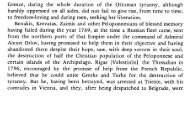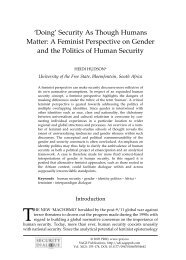Hall, The Balkan Wars
Hall, The Balkan Wars
Hall, The Balkan Wars
You also want an ePaper? Increase the reach of your titles
YUMPU automatically turns print PDFs into web optimized ePapers that Google loves.
THE BALKAN WARS, 1912-1913<strong>The</strong> Bulgarians were by and large satisfied with this arrangement. <strong>The</strong>yobtained Serbian recognition for their claims to most of Macedonia. <strong>The</strong>ywere confident that their liberator and traditional friend Russia would ensurein the end that the "disputed zone" would also come to Bulgaria. <strong>The</strong> Serbs,however, were not as enthusiastic about the treaty. Elements in the Serbianarmy, including the chiefof staff; General Radomir Putnik, were dissatisfiedwith the treaty, and the leader of the Serbian Radical Party, Nikola Pashich,did not like it. He wrote, "in my opinion we conceded too much, or bettersaid, we abandoned some Serbian areas which we should never have daredto abandon even if we were left without an agreement."26 <strong>The</strong> source of thisdissatisfaction was Macedonia. <strong>The</strong> agreement with Bulgaria gave Serbia aclear claim only to Kosovo and the Sandjak of Novi Pazar. <strong>The</strong>y would onlyacquire the "disputed zone," the northwestern corner of Macedonia, as thebeneficiaries of Russian arbitration. Many Serbs had aspirations to allMacedonia. Milovanovich's premature death in July 1912 removed a forcefor moderation in the Serbian government. Six weeks after his death, theardent nationalist Nikola Pashich became prime minister and minister forforeign affairs. Never a strong partisan of the agreement with Bulgaria,Pashich remained a strong advocate of a maximalist Serbian agenda.Even before the finalization of arrangements between the Bulgarians andthe Serbs, the Sofia government began to pursue talks with Athens toward aBulgaro-Greek alliance. <strong>The</strong> Greeks had long been interested in anarrangement with Bulgaria directed against Turkey. In the aftermath of itshumiliation in the Cretan crisis of 1909, the government in Athens madenumerous overtures to S~fia.~' <strong>The</strong>se proposals continued until the autumnof 1911, when the Bulgarians, whose negotiations with the Serbs wereongoing, at last responded positively. Negotiations between Greece andBulgaria continued until the signing of a treaty in Sofia in May 1912.2H <strong>The</strong>treaty provided for political and military cooperation against the Ottomanempire without stipulating any specific division of Ottoman territories. Thiswas largely the fault of the Bulgarians. <strong>The</strong>y sought an alliance with theGreeks mainly to secure the assistance of the Greek navy against theOttomans. <strong>The</strong> Bulgarians had little faith in the military abilities ofthe Greeksand were confident that their own larger and stronger army could seize theterritories in Macedonia they sought before the Greeks could arrive. Thisarrogant attitude would have important repercussions.During the summer of 1912, the Greeks then concluded "gentlemen'sagreements" with Serbia and M~ntenegro.~~ <strong>The</strong> Serbs and Greeks hadnegotiated throughout the summer of 1912. Although the Greeks submittedthe draft of an alliance proposal on 22 October, the arrangements wereincomplete by the time of the outbreak of war, because of issues such as thedivision of conquered territory and the obligation of Greece to aid Serbia incase of Austro-Hungarian intervention. <strong>The</strong> Greeks had no firmcommitments from any of the Slavic <strong>Balkan</strong> allies, other than the agreementto fight the Ottomans.BALKAN WAR ORIGINSAfter the signing of the Bulgarian-Greek alliance, the Bulgarians and theSerbs separately approached Montenegro. <strong>The</strong> Montenegrins were wellaware of the <strong>Balkan</strong> trend toward confrontation with the Ottoman Empire.Since December 1910, King Nikola had begun to arm Catholic tribesmenin northern Albania and to encourage attacks on centers of Ottoman authorityCoincidentally, he began to approach the other <strong>Balkan</strong> states. In January1911, Nikola proposed to the Serbian ambassador in Cetinje an agreementfor "mutual advance in case of pending events in the balk an^."^" In June1911, he approached the B~lgarians.~' Sofia did not respond until thearrangements with Belgrade and Athens were in place. <strong>The</strong>n the Bulgariansreplied favorably and made an agreement in August 1912." <strong>The</strong> Serbs finallyanswered Nikola in September 1912. <strong>The</strong> two Serbian states signed a politicaland military alliance "aimed at the liberation of Serbs under the Turkishyoke" in Lucerne, Switzerland, on 27 September."With the Montenegrin agreements the <strong>Balkan</strong> League was complete. Itwas a flawed and flimsy diplomatic instrument, accomplished in haste andbased upon self-interest. Bulgaria had formal written alliances with Greece,Montenegro, and Serbia. Serbia had a written agreement with Montenegro.<strong>The</strong> Greco-Serbian and Greco-Montenegrin agreements were merely oralarrangements, difficult to enforce. <strong>The</strong> <strong>Balkan</strong> allies were now ready to fightto complete the process of national unity.By the summer of 1912, Ottoman control ofthe <strong>Balkan</strong>s had deteriorated,especially in Albania and Macedonia. Albanian disorders became morewidespread. <strong>The</strong> bombing of a marketplace in Kochana, Macedonia, byIMRO elements as deliberate provocation resulted in the massacre of overone hundred Slavs there and outraged the Bulgarians. Ottoman efforts todisarm the <strong>Balkan</strong> population came to nothing. <strong>The</strong> Ottoman militaryremained engaged in a losing effort against Italy. One casualty of this stringof difficulties was the Young Turk government. At the end of August ananti-Young Turk faction in the army brought a new government to power.Preparations for warIn pursuit of nationalist goals the <strong>Balkan</strong> states had all built up large militaryestablishments. <strong>The</strong>se armies all received large amounts of the nationalbudgets. <strong>The</strong>y all became strong enough to challenge any constitutional orother political restraint. In addition, they all attempted to pursue strongnationalist agendas of their own. Finally, all of these military establishmentsviewed the possibility of war with the Ottoman Empire as an excitingopportunity. <strong>The</strong> Serbian deputy chief of staff, Colonel Zhivojin Mishich,later remembered,Among all our people, and especially in the military, an unusually broadmood in favor of this war prevailed. Absolutely no one doubted a




